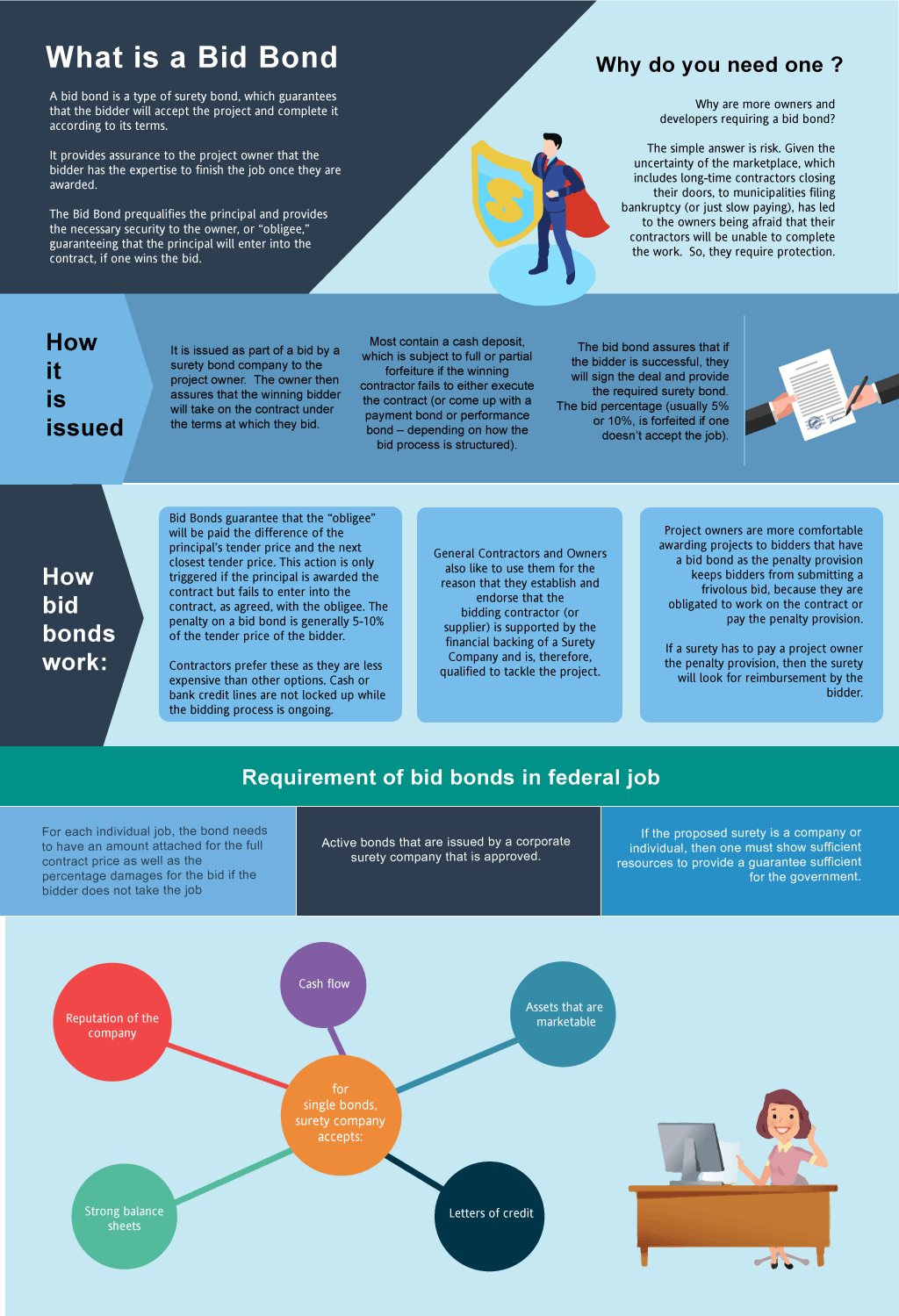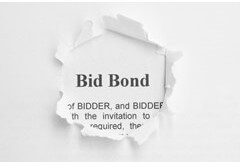You can now get a Bid Bond (almost) instantly. For Bids under $100,000, click here 
For all bids greater than $100,000, get our Express Application form:
Express Application (click to download form)
- Complete the form and email to [email protected].
- Be sure to include the RFQ/ITB (bid specs from the obligee).
What is a Bid Bond in South Dakota?
A bid bond is a type of surety bond, that guarantees that the bidder will accept the project and complete it according to its terms. It provides assurance to the project owner that the bidder has the ability and ability to finish the job once you are selected after the bidding process. The simple reason is that you need one so that you get the work. But the bigger question is why are more owners/developers requiring a bid bond in the first place? The basic answer is risk. Given the uncertainty of the marketplace, which includes long-time contractors closing their doors, to municipalities filing bankruptcy (or just slow paying), has led to owners being afraid that their contractors will be unable to complete the work. So, they require a some protection.
Just fill out our bond application here and email it to [email protected] - click here to get our South Dakota Bid Bond Application

A bid bond is issued as part of a bid by a surety bond company to the project owner. The owner is then assures that the winning bidder will take on the contract under the terms at which they bid.
Most bid bonds contain a bid percentage (usually 5% or 10%, is forfeited if you don’t accept the job).

How much does a Bid Bond Cost in South Dakota?
Swiftbonds does not charge for a bid bond (with two exceptions, see below). The reason that we don't charge for a bid bond is that we will charge for the P&P bond if you win the contract. The cost of a bid bond can vary widely depending on the amount of coverage that is required (see below).
Two exceptions for bid bond charges:
1) We do charge for Overnight fees
2) We will charge you if there is NOT going to be a bond on the contract.
How much do bonds cost in SD?
Bond prices fluctuate based on the job size (that is, it's based on the cost of the underlying contract). The cost of a bond is estimated through a couple of back-of-the-envelope calculations. In general, the cost is approximately three percent (3%) for jobs under $800,000 and then the percentage is lower as the contract amount increases. We work diligently to find the lowest premiums possible in the state of South Dakota. Please call us today at (913) 286-6501. We'll find you the very best rate possible for your maintenance bond or completion bond. Things that can affect this pricing are the perceived risk of the job, the financial position of the entity being bonded, plus other factors.
| Bond Amount Needed | Fee |
| <$800,000 | 2-3% |
| >$800,000<$1,500,00 | 1.5-3% |
| >$1.500,000 | 1-3% |
These rates are for Merit clients, Standard rates are higher. See our Performance Bond Cost page for more.
How do I get a Bid Bond in South Dakota?
We make it easy to get a contract bid bond. Just click here to get our South Dakota Bid Bond Application. Fill it out and then email it and the South Dakota bid specs/contract documents to [email protected] or fax to 855-433-4192.
You can also call us at (913) 286-6501. We will review each and every application for bid bonds and then submit it to the surety that we believe will provide the best bid bond for your company. We have a excellent success rate in getting our clients surety bonds at the very best rates possible.
Understanding South Dakota Bid Bonds: A Crucial Element in Public Projects
From our experience, a South Dakota Bid Bond is an essential requirement for contractors seeking to participate in government projects. It’s a type of surety bond that guarantees the contractor will honor their bid if selected, providing financial protection to the project owner. Essentially, it ensures that the contractor has the financial capacity and intention to complete the project as proposed, reducing the risk for public entities.

Locating a Bid Bond Provider in South Dakota
We’ve come to appreciate the ease of finding a Bid Bond provider in South Dakota. Numerous surety bond companies offer competitive rates and quick application processes for contractors. With local agents familiar with state laws and project requirements, securing a bid bond has never been more convenient. Online platforms also play a key role, allowing contractors to easily compare rates and apply for bonds from the comfort of their office.
How to Find a Reliable Bid Bond Provider
In our observation, finding the right bid bond provider requires some diligence. Start by researching local agents or companies that specialize in surety bonds. It’s crucial to work with a provider who understands South Dakota’s specific regulations and project requirements. We’ve consistently found that word of mouth and online reviews are useful resources for evaluating bond companies. Additionally, contractors can approach their industry associations or colleagues for recommendations on trustworthy surety bond providers. Ultimately, choosing a reliable provider ensures smooth and efficient handling of your bid bond application.
Who Benefits from a South Dakota Bid Bond?
We’ve consistently observed that bid bonds are beneficial to both contractors and project owners. For contractors, a bid bond demonstrates credibility and increases the chances of securing lucrative contracts. Meanwhile, for project owners, it provides assurance that the selected contractor has been vetted and is capable of fulfilling the project’s requirements. If a contractor fails to follow through, the bond ensures compensation to cover the costs of rebidding or other financial losses.
Specific Parties Who Benefit from Bid Bonds
From what we’ve seen, several parties directly benefit from bid bonds in South Dakota:
- Contractors – Gain credibility and access to higher-value projects.
- Project Owners (Obligees) – Are assured that the selected contractor is financially capable and willing to undertake the project.
- Government Entities – Benefit from fewer disruptions in public projects due to contractor defaults.
- Surety Companies – Strengthen their portfolio by underwriting reliable and trustworthy contractors.
- Taxpayers – Indirectly benefit from smoother, more efficient public infrastructure projects.
These key players are all interconnected in the bid bond process, ensuring that each party's interests are safeguarded.
We provide bid bonds bonds in each of the following counties:
Aurora
Beadle
Bennett
Bon Homme
Brookings
Brown
Brule
Buffalo
Butte
Campbell
Charles Mix
Clark
Clay
Codington
Corson
Custer
Davison
Day
Deuel
Dewey
Douglas
Edmunds
Fall River
Faulk
Grant
Gregory
Haakon
Hamlin
Hand
Hanson
Harding
Hughes
Hutchinson
Hyde
Jackson
Jerauld
Jones
Kingsbury
Lake
Lawrence
Lincoln
Lyman
McCook
McPherson
Marshall
Meade
Mellette
Miner
Minnehaha
Moody
Pennington
Perkins
Potter
Roberts
Sanborn
Shannon
Spink
Stanley
Sully
Todd
Tripp
Turner
Union
Walworth
Yankton
Ziebach
And Cities:
Sioux Falls
Rapid City
Aberdeen
Brookings
Pierre
Mitchell
Yankton
Spearfish
Deadwood
Sturgis
See our Tennessee Bid Bond page here.
More on Bid Bonds https://swiftbonds.com/bid-bond/.
Key Considerations for Contractors Seeking Bid Bonds
In our line of work, we’ve seen that contractors must carefully assess their financial stability before applying for a bid bond. This is because surety companies evaluate financial statements, experience, and project history. Contractors should ensure they meet the bond's conditions to avoid complications down the road. Additionally, maintaining clear and honest communication with the surety company can help streamline the approval process.

Detailed Considerations for Bid Bonds
In our dealings with contractors, we’ve identified key factors that every contractor should assess before applying for a bid bond:
- Financial Stability: Surety companies assess your financial health by reviewing your balance sheets, income statements, and cash flow reports. A strong financial position demonstrates that you can handle the project financially.
- Work History and Experience: We’ve often noticed that contractors with a proven track record of successfully completed projects are more likely to secure favorable bid bond terms. Highlighting past successes can build confidence with the surety provider.
- Project Scope: Understanding the scope and complexity of the project is critical. Our experience has taught us that larger or more complex projects may require a higher penal sum, which can affect your bond application process.
- Credit History: We’ve consistently found that a contractor’s credit score plays a significant role in their bid bond approval. A good credit history can result in lower bond costs and faster approval times.
- Communication with the Surety: We’ve come to understand that clear communication with the surety company throughout the project is essential. Keeping them updated on any potential risks or project changes can prevent delays or disputes during the bonding process.
What Exactly is a Surety Bid Bond?
We’ve learned that a surety bid bond is a contract between three parties: the project owner (obligee), the contractor (principal), and the surety company. The bond guarantees the contractor will accept the contract if their bid is chosen. If they fail to do so, the surety company steps in to cover any costs incurred by the project owner. This ensures a seamless transition from bidding to project completion without financial or procedural hiccups.
The Inner Workings of a Bid Bond: A Simple Breakdown
In our observation, a bid bond operates as a preemptive safeguard during the bidding process. When a contractor submits a bid for a project, the bid bond accompanies it, acting as a guarantee that the contractor will sign the contract if awarded the project. If the contractor backs out after being selected, the bond compensates the project owner for losses, up to the bond’s penal sum, which is usually a percentage of the project’s total bid amount.

Applying for a Surety Bid Bond in South Dakota: What to Know
We’ve had the privilege to guide contractors through the bid bond application process in South Dakota, and it typically involves submitting financial documents, personal credit history, and information about the project being bid on. Surety companies evaluate this data to assess risk. Contractors with a solid financial standing and a track record of successfully completed projects are more likely to receive favorable terms.
Step-by-Step Guide to Applying for a Bid Bond
We’ve often found ourselves guiding contractors through a step-by-step process for applying for a bid bond:
- Gather Financial Documents: Collect your company’s balance sheets, income statements, and tax returns. From our own observations, having these documents organized is crucial for a smooth application process.
- Prepare Project Details: Ensure you have clear information on the project, including bid amounts, timelines, and scope. We’ve seen firsthand that incomplete project details can slow down your application.
- Check Your Credit Score: Our experience tells us that a healthy credit score can increase your chances of approval. If necessary, take steps to improve your credit standing before applying.
- Complete the Bid Bond Application: Fill out the application form provided by the surety bond company. We’ve worked closely with surety companies that provide clear, concise applications, so ensure all information is accurate and complete.
- Submit the Application and Pay Fees: Once everything is in order, submit your application along with the applicable fees. We’ve often noticed that prompt payment of fees helps avoid any delays in processing.
- Undergo Surety Review: We’ve come to notice that surety companies will review your financial health, project details, and work history before making a decision.
- Receive Approval or Feedback: If approved, you’ll receive the bid bond, which you can then submit with your project bid. If not, we’ve encountered situations where contractors are asked to provide more information or make corrections before final approval.
The Cost of a Surety Bid Bond: An Affordable Safeguard
We’ve found through experience that the cost of a bid bond in South Dakota is generally a small percentage of the total project bid. Typically, this percentage ranges from 1% to 3%, though rates may vary depending on the contractor’s financial strength and the size of the project. It’s an affordable measure for contractors to demonstrate reliability and is often a prerequisite for bidding on government contracts.
Potential Denial: What to Do if Your Bid Bond Application is Rejected
Our experience has shown us that contractors may face bid bond application denial due to poor credit scores, lack of financial documentation, or limited experience in the construction field. To mitigate this risk, contractors should ensure they have their financials in order before applying. Working with an experienced agent can help identify potential red flags early in the process, making it easier to address them before formal application submission.
Steps to Avoid Bid Bond Application Denial
We’ve come to believe that the following steps can help contractors avoid bid bond application denial:
- Improve Credit Score: In our dealings with surety providers, we’ve found that a strong credit score can significantly increase approval chances. Regularly check your credit report and resolve any discrepancies.
- Organize Financial Documents: We’ve often worked on bond applications where missing financial documentation led to delays. Ensure all financial statements are up-to-date and accurate, showcasing your company’s ability to manage the project.
- Build a Strong Work History: From our experience, contractors with a portfolio of successfully completed projects are viewed more favorably by surety companies. Highlight your past accomplishments and present them clearly in your application.
- Communicate Early with a Surety Agent: We’ve seen firsthand that early communication with a bond agent helps identify potential issues before submitting your application. Discuss any concerns or unusual project requirements ahead of time to avoid last-minute rejections.
- Provide Adequate Project Details: We’ve noticed through our work that incomplete or vague project information can raise red flags for surety providers. Ensure your bid bond application includes clear and thorough details about the project scope and timeline.

Final Thoughts: Why Bid Bonds Matter for South Dakota Projects
We’ve come to believe that bid bonds are indispensable in South Dakota’s construction industry. They provide security for public and private projects, ensuring contractors are both capable and committed to completing their work. For contractors, a bid bond offers
